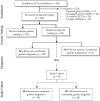Genetic Testing among Children in a Complex Care Program
- PMID: 28531152
- PMCID: PMC5448000
- DOI: 10.3390/children4050042
Genetic Testing among Children in a Complex Care Program
Abstract
Little is known about the pattern of genetic testing and frequency of genetic diagnoses among children enrolled in structured complex care programs (CCPs). Such information may inform the suitability of emerging genome diagnostics for this population. The objectives were to describe the proportion of children with undiagnosed genetic conditions despite genetic testing and measure the testing period, types and costs of genetic tests used. A retrospective analysis of 420 children enrolled in Toronto's Hospital for Sick Children's CCP from January 2010 until June 2014 was conducted. Among those who underwent genetic testing (n = 319; 76%), a random sample of 20% (n = 63) was further analyzed. A genetic diagnosis was confirmed in 48% of those who underwent testing. Those with no genetic diagnosis underwent significantly more genetic tests than those with a confirmed genetic diagnosis [median interquartile range (IQR): six tests (4-9) vs. three tests (2-4), p = 0.002], more sequence-level tests and a longer, more expensive testing period than those with a genetic diagnosis [median (IQR): length of testing period: 4.12 years (1.73-8.42) vs. 0.35 years (0.12-3.04), p < 0.001; genetic testing costs C$8496 ($4399-$12,480) vs. C$2614 ($1605-$4080), p < 0.001]. A genetic diagnosis was not established for 52% of children. Integrating genome-wide sequencing into clinical care may improve diagnostic efficiency and yield in this population.
Keywords: children with medical complexity; complex care; genetic testing; health care utilization.
Conflict of interest statement
The authors declare no conflict of interest. Funding for this project was provided through the Social Paediatrics Research Summer Studentship (SPReSS) program at the Hospital for Sick Children. The funders were not involved in the design or conduct of the study or preparation, review or approval of the manuscript. The authors have indicated they have no financial relationships relevant to this article to disclose.
Figures
References
-
- Berry J.G., Agrawal R., Kuo D.Z., Cohen E., Risko W., Hall M., Casey P., Gordon J., Srivastava R. Characteristics of hospitalizations for patients who use a structured clinical care program for children with medical complexity. J. Pediatr. 2011;159:284–290. doi: 10.1016/j.jpeds.2011.02.002. - DOI - PMC - PubMed
LinkOut - more resources
Full Text Sources
Other Literature Sources



